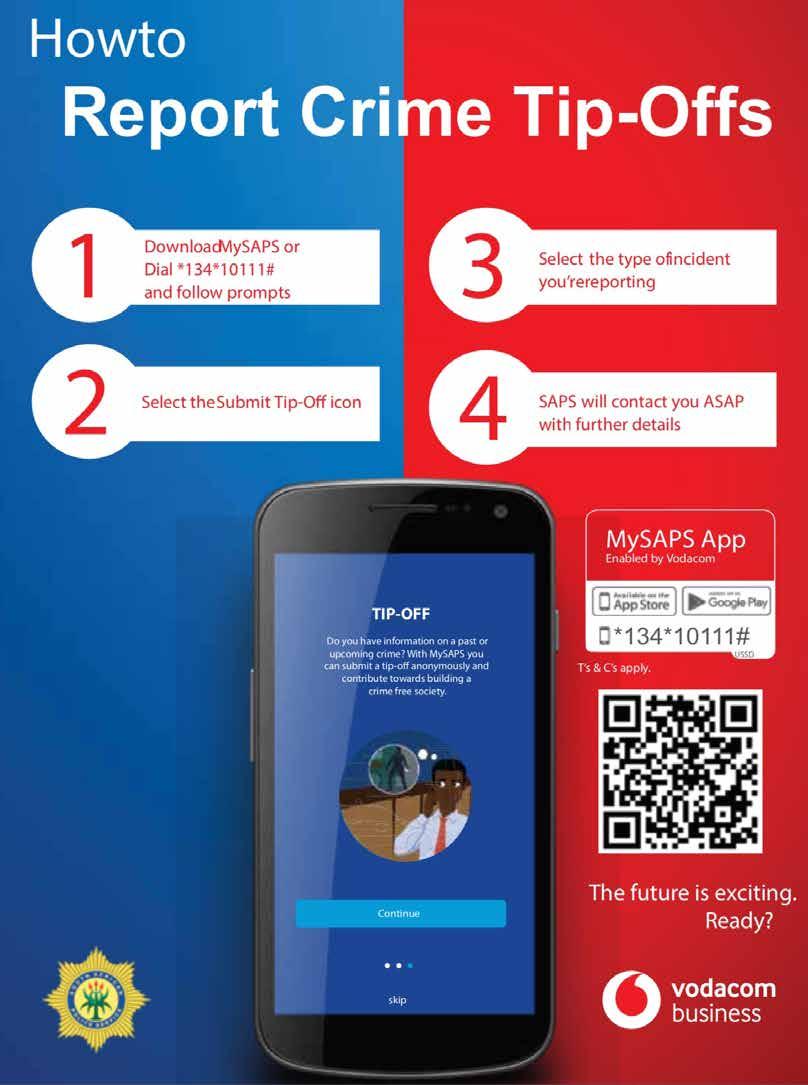












Crime and corruption are strangling South Africa –draining state coffers and driving people to look elsewhere to live and invest.
Recently released crime statistics for April to June 2022, show that 855 women and 243 children were killed and 6 424 people were murdered – a yearon-year increase of 664. Almost 500 fewer rapes were reported, but it should be noted that 9 516 reported rapes in three months remains unacceptable.
Behind each statistic are people whose lives are impacted – who suffer flashbacks and live with an increased level of fear.
The figures released by the South African Police Service (SAPS) each quarter both inform crime-fighting policy and plans, and maintain public transparency. However, we do not need them to tell us what we all know – that crime in South Africa is shockingly high.
Given our nation’s socioeconomic challenges, changing the narrative will not be a quick fix, but government continues to provide mechanisms to support the fight against crime.
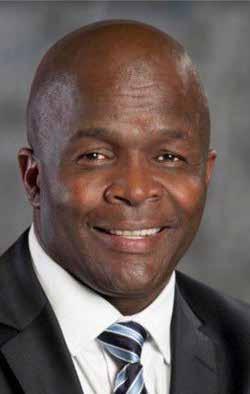
Measures taken include the strengthening of the Asset Forfeiture Unit, Specialised Commercial Crimes Unit, Directorate for Priority Crime Investigation (Hawks) and the multidisciplinary Fusion Centre – which addresses priority financial crimes, as well as the establishment of the Investigating Directorate in the National Prosecuting Authority (NPA) to handle serious corruption, and a specialised court for civil cases arising from investigations by the Special Investigating Unit (SIU).
The success of these interventions is evident in the increased number of people arrested for crime and corruption, the increased number of cases going to court, the successful convic -
tions and the recovery of misappropriated state funds.
It is impossible to list all successes, but a scan of news headlines will show the good progress being made.
Over the past four years, the Hawks have arrested more than 12 000 people and secured nearly 4 450 convictions. The unit is currently probing 22 477 cases with a combined monetary value of about R1.5 trillion, including cash-in-transit robberies, drug and human trafficking, organised crime, cybercrime and corruption.
In the past financial year, the Fusion Centre has supported 276 fraud and corruption investigations and helped ensure the
preservation and recovery of R659 million in pilfered public funds.
The NPA’s Investigating Directorate has enrolled over 20 corruption cases in the past year and 65 accused have been charged. These include several ‘state capture’ cases.
Visible policing in hotspot areas has seen more firearms and drugs taken off the streets. Government has also held Izimbizo in these areas to hear residents’ concerns and find ways to best serve communities.
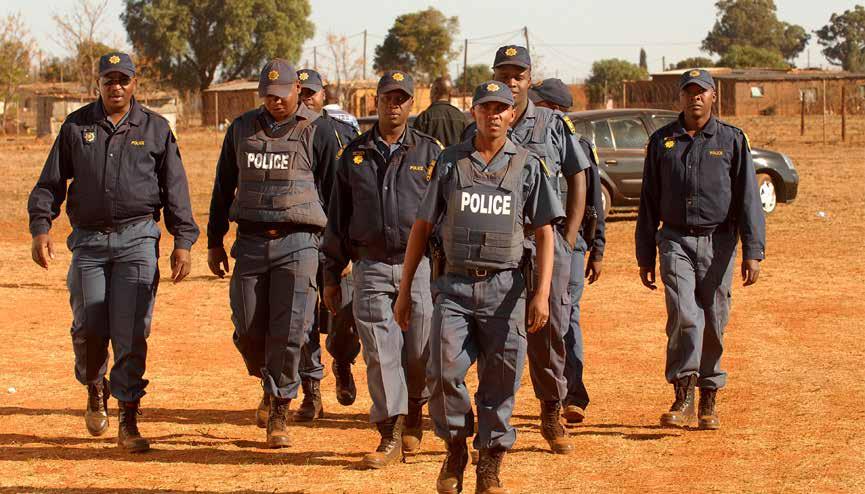
Apart from the Fusion Centre and various task teams established for specific problems, such as the theft of copper cables, there is evidence of
increased collaboration between government entities to combat crime. Recent examples are the memorandum of understanding, signed in August 2022, between the SIU and the Council for Scientific and Industrial Research, to find technological solutions for tackling cybercrimes; and the partnership between Transnet Freight Rail and the SAPS to fight infrastructure theft and line sabotage.
The most important crimebusting partnership, however, is that between government and the public. As we celebrate Heritage Month, Tourism Month and Public Service Month – all in September – we need to remember that the Constitution
is built on our shared culture of Ubuntu, which manifests in compassion for and valuing others.
A nation rooted in Ubuntu does not harbour criminals or relinquish its responsibility to others. It does not allow criminality to derail state efforts to help the vulnerable or grow the economy. It does not contribute to tourists reconsidering South Africa as a destination because of safety fears.
Together, we must take our country back from those who have lost their way so that we can feel pride in our nation and safe on our streets and in our homes.
Three interlinked awareness campaigns are commemorated in South Africa in September – Public Service, Tourism and Heritage months.
There is considerable synergy between heritage and tourism, given the emerging desire of travellers to immerse themselves into a country’s culture. Tourists no longer want to experience only the top sightseeing spots; instead, they want an authentic visitor experience, such as those offered by cultural villages and township tours.
Despite this move to cultural and heritage tourism, both domestic and international travellers expect a positive and rewarding experience. Thus, poor city infrastructure, a lack of service delivery, crime and water and electricity challenges are damaging to South Africa’s tourism sector, which has the potential to be a driver of economic growth. According to Statistics South Africa, in 2018 – before the advent of Covid-19 – the direct contribution of the tourism sector to the country’s gross domestic product was R130 billion.
The theme of this year’s Integrated Public Service Month is; “Batho Pele Revitalisation: Walking the Talk”. It is a call to public servants to remember why government incorporated a people-first philosophy into its transformation framework 25 years ago.
The reason holds true today.
If public servants keep the interests of the people of South Africa at the heart of everything they do, there will be tangible results for citizens on a personal level and for the nation as a whole.
In March, Cabinet approved the Batho Pele Revitalisation Strategy as part of efforts to professionalise the Public Service and drive behavioural change. In the coming months, we will hear more about the implementation of this strategy, but public servants need not wait to effect change. By treating people with respect and dignity and by practising compassion, which is part of our culture of Ubuntu, we can start making a difference. And if our actions rub off on our colleagues, and our department’s actions rub off on the next department, and so forth, we can catalyse a revolution in the public sector. Bit by bit, we can transition into a public administration
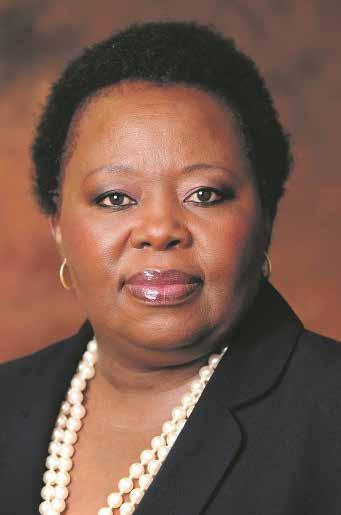
that gives life to the wonderful principles in South Africa’s Bill of Rights and uphold the people-first philosophy that was embraced by the men and women who helped give birth to our democratic nation three decades ago.
And what a wonderful nation it is, brimming with diverse cultures, breath-taking scenery and friendly people with the ability to laugh through dark times. As we get down to the serious business of fixing what is wrong in our country, we must not forget to enjoy its many wonders. And what better way to do that than by becoming a tourist in your own country?
Open your eyes to the magic that is South Africa this September by glorying in the diversity of our people and our landscapes. Feel proud to be a South African and even prouder of the part you play as a public servant in helping this beautiful country of ours reach its full potential.
It has come to the attention of the GCIS that unknown people are approaching suppliers of the GCIS soliciting bribes in exchange to be awarded tenders advertised by the GCIS. The GCIS conducts its procurement processes in a fair and lawful manner and has a policy of zero tolerance regarding corrupt practices by any person including its employees and suppliers.
The GCIS encourages and urges all members of the public who are approached by these unscrupulous individuals to immediately report such conduct to law enforcement agencies.

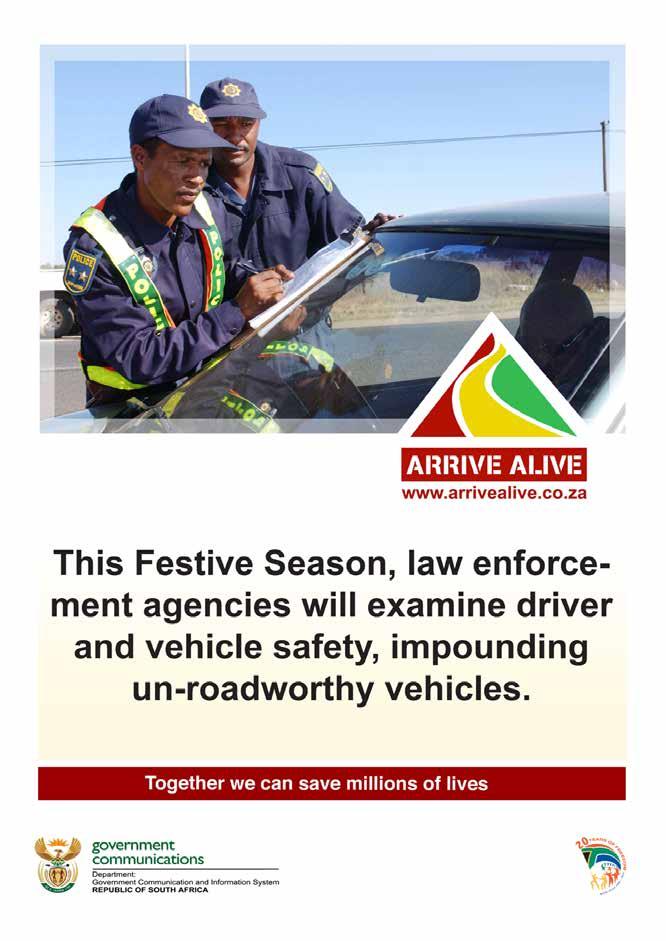

The Gauteng Department of Economic Development (GDED) is making great strides in driving an inclusive economy in the province.
The department’s mandate is to drive initiatives that spur growth in the province’s 10 priority sectors.
“We also focus on major industrial corridors – anchored by special economic zones (SEZs), new green energy approaches and integrated logistics networks – and whole-of-government efforts to develop targeted township areas as multi-layer enterprise zones under the new Township Economic Development Act,” says GDED Economic Planning and Development Deputy Director-General Jak Koseff, who has spent the majority of his career in the Public Sector.
Koseff, who has been involved in various economic acceleration initiatives – including the Tshwane Automotive SEZ and the Lanseria Smart City Initiative – was seconded to the GDED in 2020 to help navigate the Township Economic Development Act

through the Legislature. He was also partially seconded to The Presidency to work with the Investment and Infrastructure Office.
Koseff now oversees GDED units that drive the Township Economy Programme; initiatives that grow and support specific sectors; and initiatives that conduct analysis and policy research. He also drives the consolidated Broad-Based Black Economic Empowerment Programme targeting the new township enterprise zones (TEZs), and is deputy head of the Economic Acceleration
and Job Creation War Room. The war room was launched as a public-private partnership in July 2021 to focus on high-impact projects and programmes.
The new Act, which was signed by Gauteng Premier David Makhura in April, is expected to enable the creation of TEZs.
“TEZs will allow government to deploy tools to develop and diversify the economy of a
specific township area, supporting the expansion of existing small, medium and micro enterprises (SMMEs) and the creation of new ones. This will create jobs in the areas where the largest clusters of workers live and can easily access them,” says Koseff.
The TEZs are aimed at cutting red tape to make formalising and maintaining a business easier; ensure 40% procurement from businesses by the provincial government (over R17 billion a year); target enterprise and supplier development; and ensure socio-economic and skills development spending by the provincial government (over R6 billion a year).
Businesses will also be prioritised for financing through the new Township Economy Partnership Fund, a partnership between the Gauteng Enterprise Propeller and the Industrial Development Corporation.
Within TEZs, specific areas can also be designated as township enterprise precincts, where programmes and
regulations are focused on a specific part of the township economy, including retail clusters; digital cloud zones; manufacturing clusters; taxi economy clusters, which upgrade taxi ranks into commercial hubs; and infill residential or commercial precincts, where backyard shacks are upgraded into two-and threestory structures that house flats and business sites.
The TEZ programme will be rolled out once administrative procedures to designate them are cleared by Legislature.
“This will hopefully happen in September or October. Meanwhile, pilot township enterprise precincts are being rolled out in areas most likely to be designated as TEZs,” says Koseff.
TEZ programmes are expected to create various job opportunities, including:
• Infill residential and commercial township real estate (80 000).
• Public infrastructure (70 000).
• New real estate clusters (20 000).
• Township fibre roll-out (7 757).
• Taxi economy nodes (4 788).
“This is just the beginning of what could amount to over
a million new livelihoods in Gauteng townships by 2024.
If all planned instruments are fully deployed as intended, over R20 billion worth of net new investment will flow into the TEZs in that time,” says Koseff.
The war room drives numerous projects, including the prototype township enterprise precincts.
The Kasi Umnotho Retail Precinct Programme is anchored by R100 million worth of blended public-private funding, deployed through the Township Economy Partnership Fund, to provide working capital, stock credit, distribution centres and logistics networks to area-based clusters of township retailers.
Another category of precincts, Township Cloud Zones, are digital-opportunity clusters anchored by outsourced online-worker operations – such as customer service – with the investment in broadband used to cross-subsidise free basic broadband, hot desks and free cloud tools for digital businesses in the immediate area.
“The model will be battle-
tested at Jabulani and Nasrec in Soweto over the coming months, with another 15 possible sites currently being scoped. This is key to unlock-
As such, the GDED is championing change in Gauteng to regulate the sector.
“The war room is supporting the establishment of a cannabis industrialisation zone in Gauteng, which will cover portions of the Vaal and the West Rand. Within this zone, the full cannabis value chain is being deployed using SEZs and linked industrial parks.
ing 100 000 online-worker jobs for young township-based workers by early 2023,” says Koseff.
In his State of the Nation Address earlier this year, President Cyril Ramaphosa announced that government would review the policy and regulatory framework for industrial hemp and cannabis to realise the huge potential for investment and job creation. He highlighted that the sector had the potential to create over 130 000 jobs.
“Work is underway with relevant national departments to apply a regulatory ‘sandbox’ in this industrialisation zone, whereby Ministers approve special, streamlined regulations that can be tested and inform new regulations that will apply countrywide in 2024,” says Koseff.
The Vaal SEZ has assembled land parcels provided by local governments in the region, while the Western SEZ Task Team is working with land that is being donated by mining houses.
“In both cases, the cannabis war room team is positioning lead investors to drive the cultivation, processing and export of hemp and cannabis products. The planting season, which starts in spring 2022, will be the beginning of the cannabis industrialisation process in the new SEZ corridors,” says Koseff.
“The model will be battle-tested at Jabulani and Nasrec in Soweto over the coming months, with another 15 possible sites currently being scoped.”
Zamasomi Msomi, the Chief Financial Officer (CFO) of Trade and Investment KwaZulu-Natal (TIKZN), has succeeded in the finance field because of her unshakable integrity, ethical values and strong spirituality.

Msomi is an exceptional CFO who works to ensure accountability for each rand of taxpayers’ money. She has received four straight clean audit reports from three different public institutions, an enviable track record.
The 39-year-old, who hails from Mtwalume on the KwaZulu-Natal South Coast, says it takes day-to-day compliance with the Public Finance Management Act, 1999 (Act 1 of 1999), to achieve a clean audit. Accounting officers must follow procedure on a daily basis so they can explain all transactions when the auditing period comes, she emphasises.
Armed with a Bachelor of Commerce Accounting degree from the University of KwaZulu-Natal, Msomi has served in the Public Sector throughout her career, accounting for millions spent under her watch.
She says her main aim is to change the misconception that all public servants are corrupt. Prior to her appointment as CFO for TIKZN in 2019, Msomi worked for the KwaZulu-Natal Department of Economic Development, Tourism and Environmental Affairs (EDTA). Before that she had worked for the KwaZuluNatal Liquor Authority and KwaZuluNatal Law Society, where she served for five years as Finance Director.
The TIKZN is an entity of EDTA, responsible for promoting KwaZulu-Natal as an investment destination and facilitating trade by assisting local companies to access international markets. It
receives an annual budget of R85 million to drive investment initiatives and administer conditional grants to uplift local businesses. As CFO, Msomi ensures that every rand is spent to fulfil the mandate of the agency.
She believes that integrity is essential in her job. “Temptations will always be there when you manage money. Integrity is very important if you are a CFO. Nothing is more important than your values and what you are about. My seniors trust me to pick up anything that is not above board. As public servants, we often find ourselves with a bad reputation for fraud and corruption. I would like to kill that stigma through my work. We encourage our colleagues to always do good, even when nobody is watching,” she says.
Msomi follows some fundamental principles to achieve a clean audit, which include team building and motivation.
“You must understand your team members, their strengths and weaknesses. They are soldiers that help you achieve the goal. I categorise the process of achieving a clean audit into phases. Firstly, you need to manage your day-to-day
transactions and inform your stakeholders how to comply.
When someone wants to buy something, you need to guide them through supply chain management and budgeting.
Even if there is a budget, follow the process. Make sure that the entire organisation understands that more than a clean audit, we want a clean government.
“Secondly, there are critical phases in finance where you have to balance books, and look at the expenditure and available budget,” she says.
Msomi places emphasis on the preparation of financial statements and understanding all the transactions made by the institution.
As a woman entrusted with the pressured responsibility of providing financial oversight, she prides herself on mastering multitasking.
Msomi says being a mother, a sister and friend, while achieving her career goals, is exciting. She finds solace in sport and religion during demanding times.
“I used to play soccer, but there is no time now. I have resorted to athletics. When the going is tough, I hit the road, which helps to clear my mind while keeping my body healthy,” Msomi says, adding that she is preparing to run the Comrades Marathon next year.
Msomi says her organisation is part of stakeholders that are executing projects aimed at rebuilding small businesses, following the 2021 July unrest. The projects she has worked on include being responsible for the R30 million Industrial Development Corporation funding that was disbursed to informal traders in some parts of KwaZulu-Natal.
The TIKZN is also administering other multi-million tourism projects across the province, for which Msomi provides financial oversight. She has represented the entity at various international investor conferences, where she says bookkeeping and financial management become key to attracting investors.
“We are proud of the contribution we have made,
especially when we change the lives of marginalised people. I also share my skills with other small businesses to make it a norm to record everything so they can be able to see whether they are making money or not,” she says.
In dealing with 'undue pressure' that may be applied by internal or external forces as she deals with huge budgets and contracts, Msomi is always frank and bold about her principled stance.
She advises other female public servants in positions like hers to stand their ground and never succumb to pressure.
“To build character is to have strong moral integrity. If you have worked hard, why would you sell your soul? You must be open and frank about the process, even with the executive. This will help you in the long run because you will be known as a principled person,” Msomi says. “When you are a woman you have unique skills; we do not compare ourselves to men. Be confident and be professional enough to [be] clear and cite your case as it is.”
“ As public servants, we often find ourselves with a bad reputation for fraud and corruption. I would like to kill that stigma through my work. We encourage our colleagues to always do good, even when nobody is watching,” she says”
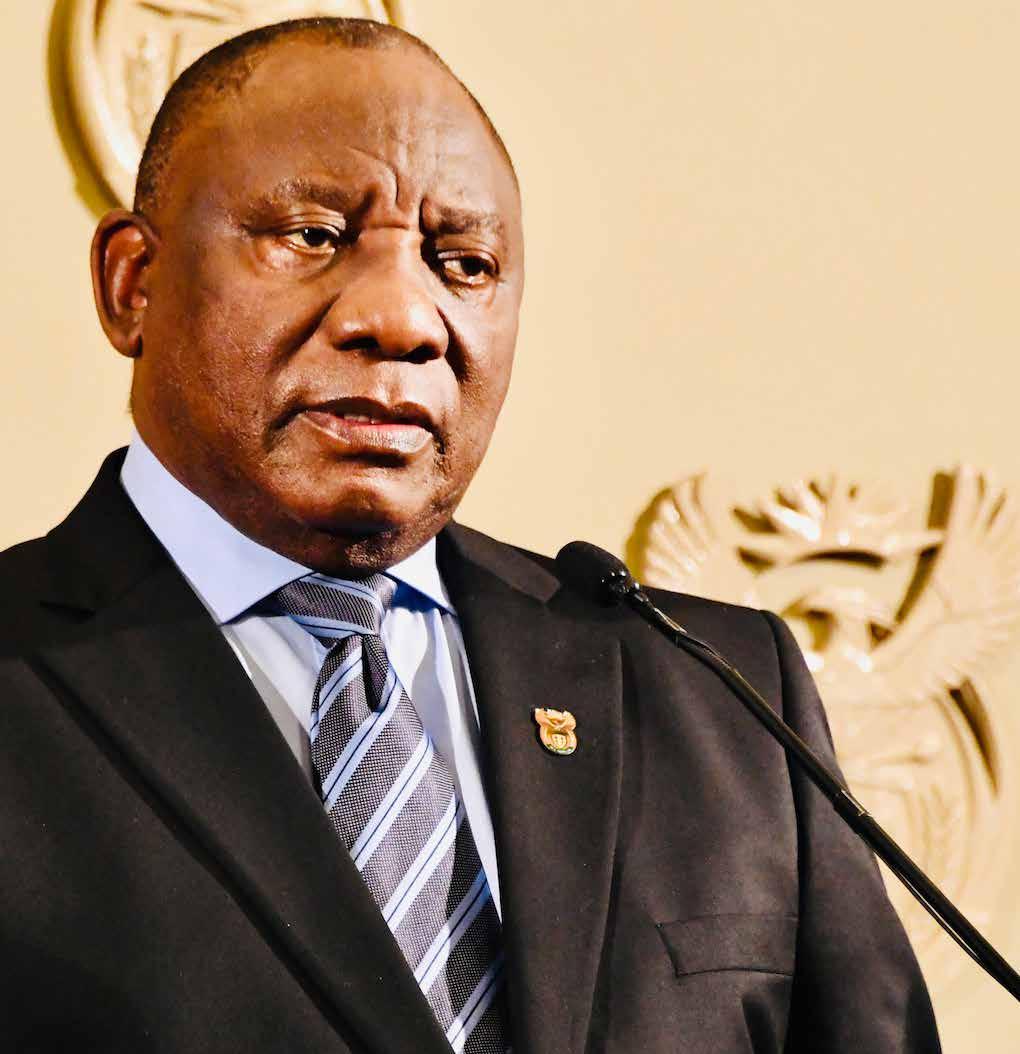
On 12 September 1977, Stephen Bantu Biko died in police custody in Pretoria Central Prison.
Human dignity, the princi-
ple at the heart of his black consciousness activism, was denied him. In the words of the family lawyer Sir Sydney Kentridge, his was “a miser-
able and lonely death on a mat on a stone floor in a prison cell”.
It remains a source of great sorrow all these years later to
recall that Steve Biko was just 30 years old when he died. He was cut down in his prime by those who feared the power and resonance of his ideas of
self-liberation and his efforts to infuse black men and women with pride and dignity.
He never got to see in his lifetime what he called ‘the glittering prize’, the realisation of a true humanity. Writing about this ideal, he famously said: “In time we shall be in a position to bestow upon South Africa the greatest gift possible – a more human face.”
When we won our freedom in 1994, we understood that the right to vote was just one part of our struggle for human dignity.
Twenty-eight years into our democracy, we are confronted with many challenges, such as poverty, unemployment and inequality. As a result, we often lose sight of how far we have come in giving effect to the principles on which our Constitution is founded and that anchored Steve Biko’s thought and teachings.
In 1977 a heartless regime killed one of our country’s most promising leaders by depriving him of the food, water and medical treatment he urgently needed as a result of brutal beatings by the apartheid police.
Twenty years later, in a 1997 judgment, the Constitutional Court said that fulfilling the
fundamental rights of every citizen and striving to achieve their socio-economic rights is the hallmark of a democratic society aiming to salvage lost dignity.
In South Africa today, we continue to work to fulfil the basic rights of every South African so that they may lead quality lives free of disease, hunger and deprivation.
Successive democratic administrations have implemented policies to salvage the lost dignity of this country’s
Financial Aid Scheme and various other forms of state support, thousands of young South Africans from poor backgrounds have been able to become doctors, lawyers, teachers, scientists, artisans and entrepreneurs.
Government supports poor and vulnerable citizens through an extensive social safety net and provides work opportunities through mass public employment programmes.
In the repressive South Africa
As a country, we have come a long way towards the fulfilment of human dignity, the principle that Steve Biko so cherished. Yet, we still have so much further to go.
Without a job, without a house, electricity or running water, without land, without skills or opportunities, millions of South Africans are still deprived of the lives they seek and deserve. That is why government is working with social partners to build an inclusive economy, create employment, enable businesses to thrive and tackle poverty and hunger.
majority by providing education, health care, housing and basic services.
In South Africa today, a decent education is a fundamental right. The State invests in early childhood development, in supporting learning outcomes for our youngest citizens, and provides social relief through school feeding programmes to ensure young learners achieve the best outcomes possible.
Through the National Student
in which Steve Biko died, freedom of speech was curtailed and political activism attracted detention or worse.
In South Africa today, young people of the same age as Steve Biko was and even younger are at the forefront of activism for causes closest to them, and they are able to organise free of harassment or banishment. Freedom of speech and association, the right to protest and the right to equality before the law is upheld for all.
In considering the relevance of Steve Biko’s life and legacy, we recall his powerful call to the people to be architects of their own liberation. This call is as important now as it was back then.
We must be focused on addressing our challenges to achieve a truly free and equal society. We each need to play our part by using the foundational rights in our Constitution to build a South Africa free of poverty and hunger, underdevelopment, crime and violence.
As Steve Biko urged, let us march forth with courage and determination on our common quest for true humanity.
“In time we shall be in a position to bestow upon South Africa the greatest gift possible – a more human face.”
Living by the Batho Pele principles, the Director-General of the Department of Public Service and Administration wants staff to follow in her footsteps.
Being Director-General of the Department of Public Service and Administration (DPSA) is no easy task, but Yoliswa Makhasi has been excel ling in this role since her appointment in March 2020.
A self-proclaimed leader, executive coach, activist and strategist, Makhasi is a seasoned senior public servant. She has more than 20 years of experi ence, including heading the Gauteng Depart ment of Community Safety and serving as a deputy director-general at the Department of Public Enterprises.
“Being a public servant is a calling for me. I am driven by the pursuit of serving and making a positive impact, especially serving the under privileged, disadvantaged and needy. As public servants, we need to embody the values and principles of public administration, as provided in Chapter 10 of the Constitution, and continu
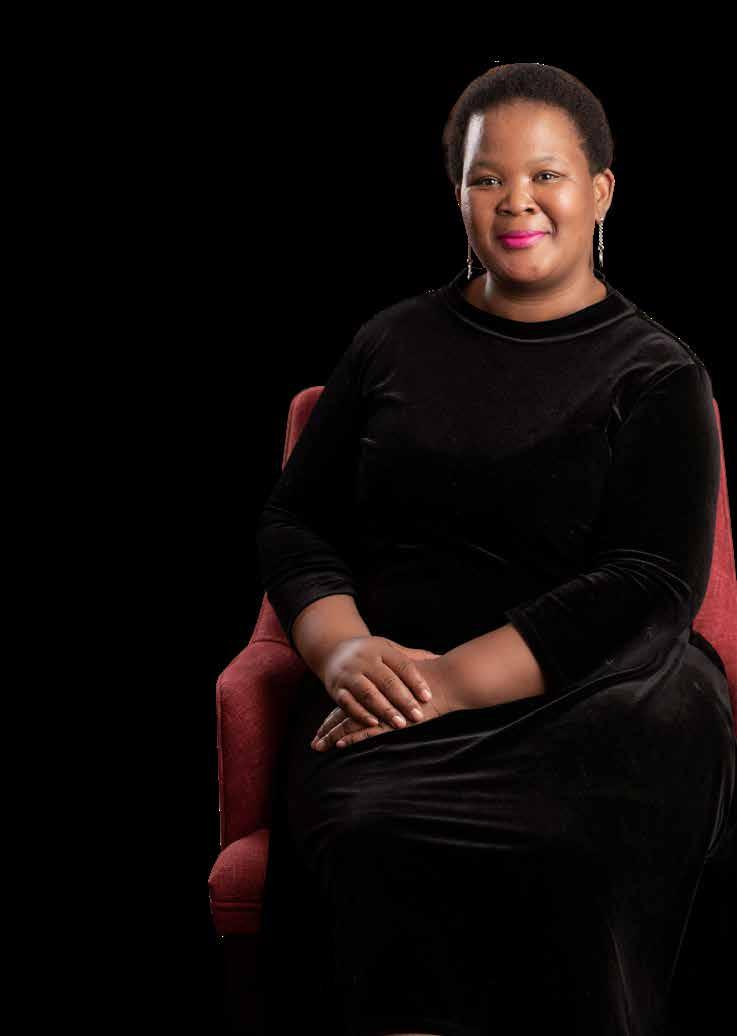
ously commit to improving the quality of services we provide to the public.”
Makhasi says as a child, her family was led by a strong female, her grandmother. “I grew up in a very big family with lots of children; we were happy, we laughed a lot and we shared everything. My grandmother was a matriarch who took care of all of us and taught me the values of love, respect, justice and fairness.”
It was her father, however, who nurtured her interest in politics and made her politically aware. “He was a political activist who later became a political prisoner. He was also a disciplinarian who watched over me with a vigilant eye to ensure that I did not do anything wrong. At the same time, he instilled a sense of activism and social justice in me.”
It was the discipline she learnt from her father that helped her achieve well academically. She holds a Bachelor of Arts Degree from the then Vista University, a Master of Science in Public Policy and Management from the University of Manchester (2005), and a Master of Philosophy in Coaching Management from the University of Stellenbosch (2019).
“I have invested a lot in
myself by furthering my education and skills development. Other than that, I was in the country at the right time, as spaces began opening up for young black females after the democratisation of our society in 1994,” she adds.
With September being Public Service Month, Makhasi says she encourages public sector managers to recommit to upholding the Batho Pele [people first] principles. “There are many challenges facing the Public Service. However, the most important is the need to ensure the provision of quality services timeously to our communities. We have seen failures in service delivery result in more challenges, such as the loss of lives and damage to property and infrastructure, among others. As public servants we belong, we serve, we care.”
She adds that as a department, they have developed several tools and capabilities, such as service delivery improvement plans, the Operations Management Framework, and business process mapping, which are geared at enabling service delivery excellence and helping other departments.
Furthermore, Makhasi says
the DPSA is working on key projects, such as reviewing the Public Service Regulations of 2016, as well as developing a human capital strategy. “These efforts are aimed at managing the wage bill, reducing red tape in administration and moving the Public Service human resources from being compliance-driven and heavily administrative to strategic.”
One of her challenges, says Makhasi, is patriarchy. She acknowledges that on numerous occasions, she has been on the receiving end of boardroom bullying, gas lighting and passive aggression. “This is entrenched in society; it exists within the Public Service and shows itself in many ways. I appeal to women leaders to be conscious of this reality and be clear about how we respond when we experience such [patriarchy]. We need not be agents of patriarchy ourselves as we are also members of the same societies.”
So passionate is Makhasi about this issue that she spearheaded the launch of the Public Sector Women in Leadership Network in August 2022 as part of the Women’s Day celebrations. “The network aims to empower and inspire women in leadership in
the Public Service to become resilient and effective managers. Through the network, our department will support and inspire the ladies.”
She acknowledges that gender transformation is slow in South African workplaces in general, mainly because of societal issues. These include traditional norms that keep women from choosing higherpaying roles, male-dominated industries, unequal access to education and discriminatory practices.
Makhasi says the Eightprinciple Action Plan for Promoting Women’s Empowerment and Gender Equality, launched by the DPSA in 2007, encourages all departments to advance equal rights in the workplace. Each August, the HODs of all government departments are required to observe Public Service Women Management Week to assess progress made in implementing the eight principles. These sessions are attended by female senior managers from all departments.
Makhasi says she still has lots more to offer the public sector. “I have a very positive disposition on life and always find something good to hang onto in my interactions with others – I don’t allow the bad stuff to triumph over the good stuff.”
When the medical school at the University of Limpopo was established in 2016, one of the first people that enrolled for the Bachelor of Medicine and Bachelor of Surgery (MBChB) programme was a 16-year-old student from Bushbuckridge in Mpumalanga, Decent Mkhombo – who became the youngest student in his class.
Currently doing his internship at Mapulaneng Hospital in his home village of Thulamahashe in Bushbuckridge, Mpumalanga, Dr Mkhombo (22) became the youngest medical doctor in the country.

He believes that the youth of

South Africa are the answer to challenges facing the country and the Public Service. Dr Mk hombo says that young people should be given an opportunity and a platform to express their ideas and solutions, which will keep the Public Service mov ing forward. This in turn will al low for better service delivery.
“Organisational culture should be promoting new thinkers, young thinkers by giving them leadership roles,” says Dr Mkhombo.
Dr Mkhombo did his matric year at Orhovelani High School before going to University of Limpopo to do his MBChB.
The young doctor says he
– he knew what to expect. He says that going into the field so young, he was pushed to maturity faster than expected, so for him it was more of a challenge on a personal level than an academic one.
“I think it forced me to find a way and to be a competent and responsible adult”, says Dr Mkhombo.
Dr Mkhombo was among the students who received part of the close to R10 million in bursaries provided by the Limpopo Provincial Government when the medical school was established.
Dr Mkhombo says as a young doctor, he is fortunate enough to have not faced any discrimination or bullying from his colleagues or patients. He attributes his success to the quality of his work. He adds that he did not have any issues working with other doctors because of his competency as a medical doctor.
Dr Mkhombo chose to do his internship training in his home village because he wanted to give back to his community before he chooses his next path in life.
“I came back just to give back to the community that raised me,” says Dr Mkhombo.
The young doctor has not fully decided on a field of specialty but understands the importance of specialising in a certain field.
He says he has a good aptitude for sepsis and gynaecology, but would like to branch into nuclear medicine.
He says he would like to enroll for that at the University of Limpopo because they have a well-established post-graduate programme.
“I want to do something that is sought after, something that can take me overseas,” says Dr Mkhombo.
Dr Mkhombo’s message to public servants is that although they may feel unappreciated at times, they should know that they are valued by those who see the effort they put forth and should continue doing the work of serving those in need.
For the youth serving in the public sector, he says: “keep doing well and expand your knowledge and yourself in the space that you occupy.”
Dr Mkhombo believes working in a public hospital is not difficult because of the structures and protocols in
place. He says that it is easier to do the work when focused on the patient and what is best for them, adding that treating patients with dignity and respect goes a long way in serving them.
“We can save lives, it’s not difficult. Being a public servant to me is not making your patient feel like less of a person,” says Dr Mkhombo.

He advises public servants to find creative ways of facing challenges in the workplace, adding that planning and execution are key in solving challenges in the Public Service and not just stating the problem.
Dr Mkhombo says that he finds fulfillment in his job because of the respect he gets from everyone.
Like most young men, Dr Mkhombo loves spending his extra time with his play station and has recently added travelling to his list of favourite things.
“Being a public servant to me is not making your patient feel like less of a person.”
Acting Public Service and Administration Minister Thulas Nxesi says he believes that the Public Service has the inherent capacity to “walk the talk” and deliver on its constitutional obligations to citizens.
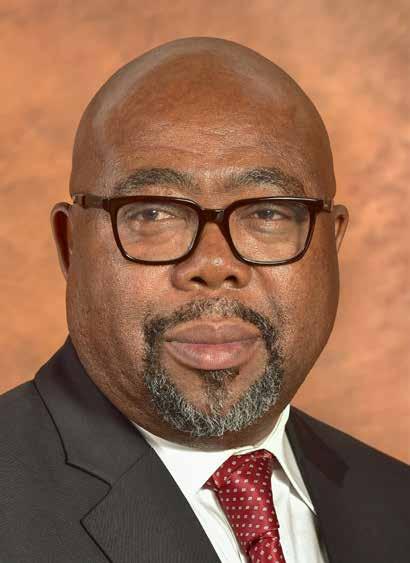
“We have seen the remarkable progress made in service delivery since democratisation in 1994, and more so, since the Batho Pele programme was introduced in 1997,” Nxesi said.
Officially launching the Public Service Month, the Minister said the Public Service has skilled, competent and resourceful officials on the job, working daily at the coalface of service delivery amid serious constraints.
He said as far back as 2013, the Diagnostic Review of the National Planning Commission identified uneven capacity within and between government departments as a challenge and potential threat to the ability of the Public Service to deliver quality services throughout the country.
“As a responsive government, we have been addressing this specific challenge through a variety of targeted capacitybuilding interventions by the Department of Public Service and Administration in partnership with the National School of Government, including initiatives such as the District Development Model.
“Notwithstanding these
interventions, I believe that our public service has the inherent capacity to walk the talk and deliver on its constitutional obligations to citizens,” Nxesi said.
Nxesi said government has the capacity to make even greater progress in improving service delivery and creating a citizen-centric public service.
“All the necessary ingredients are in place. We have supporting legislation, policies and regulations that are reviewed regularly.
“As government we have introduced the National Anti-Corruption Strategy as a necessary response to this rampant corruption.
“We recognise that this strategy will only succeed if we work in partnership with our compatriots in the private sector and civil society who are
as committed as we are to a South Africa characterised by high standards of integrity and respect for the rule of law.
“We also acknowledge that you, our public servants, are our first line of defence against corruption,” Nxesi said, adding “we must defend our freedom against the scourge of corruption that is eroding our democratic values and our dream of being a capable, ethical and developmental state”.
The Minister said government cannot professionalise the Public Service in a context where poorly qualified individuals are being parachuted into positions through political patronage.
“These practices, wherever they occur, are inconsistent with the constitutional principles that underpin public administration and they must
accordingly be stopped,” he said.
Public Service and Administration Deputy Minister Chana Pilane-Majake, explained that Public Service Month is commemorated annually to remind the public about the important role of public servants in order to mobilise political will and resources to address national, provincial and local government challenges.
“Public Service Month (PSM) is a country programme meant to promote good governance, with the continental programme being the African Union’s Africa Public Service Day.

“PSM focuses on the Public Service machinery, how it discharges its constitutional responsibility to deliver services to the citizenry, as well as give recognition to diligent
public servants upholding the values and principles of public service and administration,” she said.
This year, the month is celebrated under the theme; “Batho Pele Revitalisation –Walking the Talk”.
The month serves as a reminder of what it means to serve communities and to also look at the impact government has, especially around issues of service delivery.
This year, government celebrates the 25th anniversary of the Batho Pele White Paper as a framework for the transformation of public service delivery in South Africa. The year also marks the 25th anniversary of the Constitution of the Republic of South Africa, 1996 that was signed into law by former President Nelson Mandela. – SAnews.gov.za
Devised by the apartheid government to keep workers close to towns but neatly tucked away from sight, townships were not designed to thrive economically. But many evolved into bustling, vibrant communities, filled with music, art and entrepreneurship.
Townships today look very different to what they did three decades ago. Streets have been paved, public facilities built, the property market has boomed and shopping centres and business zones have been developed. Despite this, townships remain populated largely by people who are either unemployed or low earners.
Government’s recently proclaimed Gauteng Township Economic Development Act aims to change this by effectively linking township economies with those of wealthier urban cities to speed up the inclusive growth of the economy.
Mathopane Masha, the Director of Inclusive Economy at the Gauteng Department of Economic Development (GDED), is leading the work to implement the Act, which came into law in April 2022. Masha’s main responsibilities include designing and implementing township economy programmes; implementing enterprise and supplier development; managing developments; reviewing and implementing local economic development projects; and designing business development and funding strategies to support the growth of small, medium and micro enterprises (SMMEs).

“The conceptualisation, design and implementation of the Township Economy Programme is one of the most important milestones of my career,” says Masha, who joined the public sector as an intern.
One of the results of the Act is the establishment of the Gauteng Township Retail Programme, which was launched by Gauteng Premier David Makhura in August.
At the launch of the programme, Premier Makhura announced a R100 million
fund to support retailers.
The Gauteng Township Retail Programme will see township retail malls and supermarkets partnering with local small enterprises to buy products and services from township-based producers, service providers and manufacturers.
This will revitalise and build stronger sectors of the township economy, said Premier Makhura at the launch.
“If we want to fix the township economy, we must start with those small retail businesses and make sure they are supported by government. We want the people in the township – for generation after generation – to be the ones running these businesses,” he added.
The Act also requires, among other interventions, that Gauteng Provincial Government departments, where possible, procure at least 40% of their goods and services from township businesses.
“These procurement rules allow government and its main contractors to buy from groups of township-based enterprises, with systems linking them, so they can supply as if they
are one large enterprise,” says Masha.
Municipalities will play a crucial role in this, he says, urging public servants to accelerate the implementation of the Act.
“They are expected to adopt and adapt their bylaws and ensure consistency with the principles of the Act, provide basic services to the community, and ensure that township SMMEs operate in a conducive environment,” he adds.
This includes reducing red tape and the cost of compliance for SMMEs within their jurisdiction.
Earlier this year, the GDED called for proposals for innovative ideas and partnerships to tackle unemployment. While the first call closed in July, another call will be made before the end of this financial year.
“The department has since categorised the submissions into opportunities and the proposals are being evaluated using a prescribed government process, with a bias towards job creation, skills development and enterprise development with a socio-economic impact,” says Masha.
“The ultimate aim of the proposals is to contribute
towards job creation in the province; stimulate manufacturing, especially in townships; cluster SMMEs per sector; and connect individual entities to various enterprise and development opportunities,” he adds.
The Act will also bring various benefits to the youth. “All programmes are designed to support the youth and enable them to initiate and commercialise their ideas,” says Masha.
He explains that, for example, the Installation, Repair and Maintenance (IRM) programme aims to develop artisanal skills, with a specific focus on the youth. “The intervention also helps young people to earn an income independently and create new jobs in the process.”
The focus of the IRM programme includes manufacturing, plumbing, electrical, general maintenance, domestic appliance repair, welding, carpentry and electronics repairs, among others.
“The IRM initiative operates at the interface between supply and demand, unlocking the demand for skills in these various industries and supporting and enabling technical vocational education and training institutions to respond to this demand through agile
and flexible occupational training, combined with structured workplace learning,” says Masha.
Youth will also be able to benefit from the Cellphone Repair Project, which will provide accredited cellphone repair and business training. This will enable participants to become accredited electronic communication device retailers or repairers in their community, says Masha.
Another programme for youth is the Last Mile Scooter Project, which will link young people to scooter delivery opportunities through training, motorbike licence training and testing, job placement and the establishment of a business, and job creation opportunities. This will enable them to launch their own scooter delivery business, earn income and create jobs.
As for the future, Masha challenges his team to think outside the box and initiate projects that will benefit the province.
“In order to achieve this, the team is being capacitated – especially with regard to project management – with a focus on technology solutions to ensure successful implementation of projects,” he says.
The coronation of traditional leaders and the embrace of various cultures in South Africa is more than the showcasing of pride. Rather, the country’s rich heritage is a major drawcard for tourism, a sector that is crucial to job creation and the revival of the country’s economy in the wake of the coronavirus pandemic
(COVID-19), the riots last year and the devastating floods in coastal areas a few months ago.
Culture as a tourism magnet was on full display during the recent coronation of the AmaZulu King Misuzulu kaZwelithini in a ceremony known as Ukungena Esibayeni (Entering the Kraal).
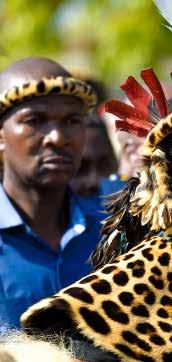

The event officially marked
the beginning of his reign as the ninth king of the Zulu nation.
Throngs of loyal subjects, dignitaries and kings from various African countries converged in Nongoma, in the north of KwaZulu-Natal, to witness the ceremony and boost the hospitality industry in the town.
King Misuzulu’s ascendance to the throne comes after the passing of his father, King Zwelithini kaBhekuzulu, in March last year after ruling for more than 50 years.
The Zulu nation boasts a rich heritage that dates back to the formation of the Zulu kingdom in 1816. King Shaka kaSenzangakhona forged a mighty nation through military
genius to change the landscape of Southern Africa.
Since then, Zulu kings have written their own history that is renowned around the world.
King Cetshwayo kaMpande made the Zulu nation known in Europe after he led the Zulu army to victory against the British army in 1879 at Isandlwana, Nquthu, in northern KwaZulu-Natal. It was Britain’s largest defeat in its colonial history. While the British came back stronger after the defeat and burnt down his Ondini Place in Ulundi before taking him to exile in England, King Cetshwayo remained highly respected.
Following this historic war, AmaZulu and the British formed strong ties, which exist to this day. This has seen kings and princes from both kingdoms invite each other for important occasions. During the annual Isandlwana commemoration on January 18, the day of
the actual war, a delegation from England always attends the ceremony to re-enact the war.
Over the years, the commemorative event has boosted the country’s tourism as people from the United Kingdom visit the Isandlwana battlefields to learn about an important slice of our country’s history.
Other parts of South Africa also boast sites that are part of the nation’s collective cultural heritage, from rock art paintings to battlefields of other wars. The country is also blessed with museums that celebrate ancient African kingdoms, sacred traditional sites and archaeological digs.
All of these sites form a rich cultural tapestry that delights tourists of all stripes.
At King Misuzulu’s enthronement, at least seven kings from African countries graced the occasion that saw over 10 000 people attend. Among them were King Gumbi Jere of the Ngoni in Malawi; King Mphezeni of Zambia; King Nyonyembe of Congo; and Queen Modjadji of Balobedu people in Limpopo. King
Misuzulu also has close ties with the Eswatini Kingdom led by King Mswati III. The king’s late mother, Queen Manthfombi, was King Mswati’s sister. While King Mswati himself was not in attendance, a delegation from Eswatini was part of the proceedings. With the Zulu royal household having a list of major events in its annual calendar, tourism campaigns in the province have aligned themselves with these events to attract more visitors. Throughout September, the king hosts three major events that attract scores of people from other provinces and African countries. The events include the two legs of the Royal Reed Dance in Emachobeni Palace in Ngwavuma, in the far north of the province, and the main reed dance at Enyokeni Palace in Nongoma. Both events attract an estimated audience of 50 000 people and have a direct impact on the tourism sector.
As part of this year’s Heritage Month, the king was expected to host a heritage event, known as Umkhosi weLembe, in KwaDukuza on September 24. The event commemorates King Shaka, whose grave is in the centre of town.

South Africa, according to African Wildlife foundation, is geopolitically distinctive and possesses natural and cultural diversity that supports a globally compelling tourism proposition.
In 2018, the foundation placed the country among the top-six most biodiverse countries in the world and said it is the most diverse for its size.
“Seven distinct biomes occur within the country’s borders
and these are showcased within five World Heritage Sites, 22 national parks and hundreds of game and nature reserves. The diversity of attractions make South Africa a preferred tourist destination,” the foundation stated in its survey.
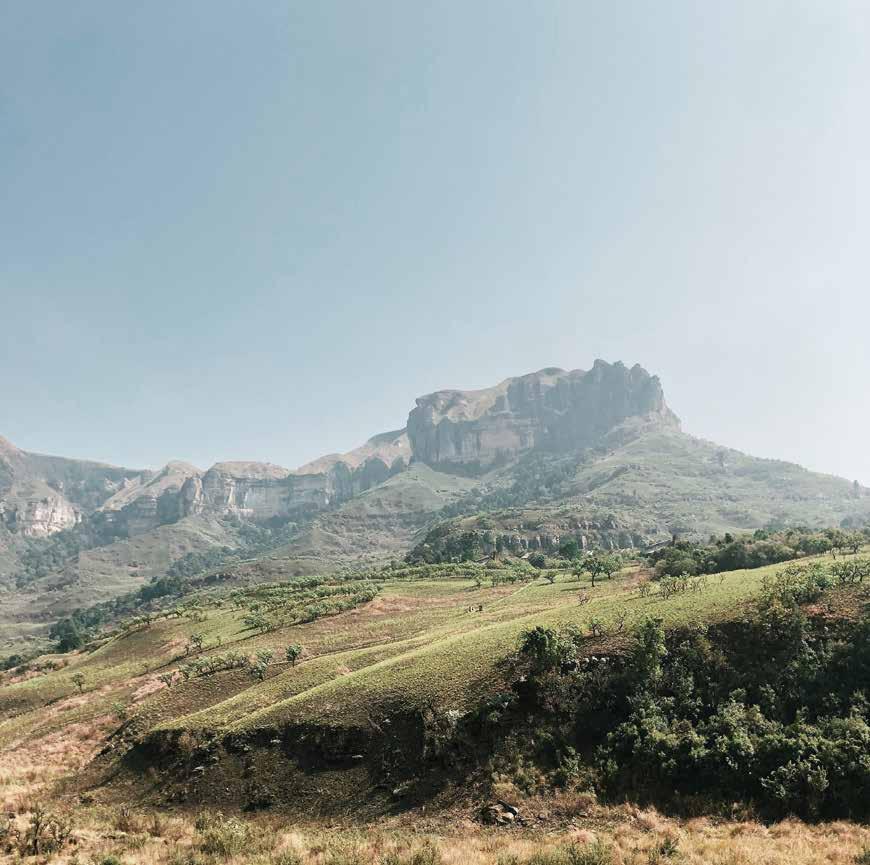
As part of the Economic Reconstruction and Recovery Plan, government has identified the tourism sector as a key driver of unleashing the country’s true potential. In collaboration with stakeholders in the sector, the Department of Tourism has developed the
Tourism Sector Recovery Plan, which was adopted by Cabinet in April 2021. The plan seeks to facilitate strategic partnerships between government and industry to make visiting South Africa easier through the implementation of e-visas, tourist safety, airlift capacity and quicker turnaround times in the processing of tour operator licences, among other objectives.
Tourism contributes 3.7% to South Africa’s gross domestic product, more than agriculture, utilities and construction. The
recovery plan is expected to help the sector to recover to its 2019 output and employment levels by 2023. Government aims to play a leading role in the creation of a tourism sector that is vibrant, diverse, inclusive and transformed.
Businesses in the tourism sector can apply for various funding from the Department of Tourism, including through the Market Access Support Programme, Tourism Grinding Support Programme and Tourism Transformation Fund.


No challenge is insurmountable, says the young woman in charge of the NYDA board.

Asanda Luwaca (30), the first female chairperson of the National Youth Development Agency (NYDA), has occupied the hot seat for just short of a year.
She was appointed by President Cyril Ramaphosa in November 2021 and heads up a seven-member board that will serve until November 2024. With the mandate of the NYDA being to tackle challenges that face the nation’s youth, the members of the board have their work cut out for them. However, Luwaca says that despite her young age, she is not cowed by the responsibilities placed on her shoulders.
Public Sector Manager magazine chatted to her about her experiences, the insights she has gained and the challenges she has faced since her appointment by the President.
She says that nearly three decades into South Africa’s democracy, it should not be a big deal that she is the first female to chair the agency. In fact, she views it as a doubleedged sword. “On the one side, it’s quite exciting being the first female to lead such an agency. The appointment by the President of a majority female board is indicative of his sheer confidence in young female leaders.”
On the other hand, however, is the fact that 28 years into democracy, we are still celebrating ‘female firsts’. She says that boasting about the first female president or chief executive officer of an organisation makes a mockery of the rights that female freedom fighters fought so hard for.
On ageism, she says that fostering inter-generational
dialogues and exchanges of our lived experiences will helps us to ‘collectively begin the process of learning, unlearning and relearning from one another’.
Luwaca says since taking office, she and the board have been making strides in engaging the youth and determining their needs. She says that under the board’s leadership, Cabinet approved an integrated youth development strategy for South Africa in June 2022. This was drafted by the NYDA,
inclusive of young people, and will guide youth development until 2030.
“We have also raised more than R150 million in additional donor funding.”
Luwaca says addressing youth unemployment is one of her key mandates. She thinks the youth’s low labour participation and lack of entrepreneurship are caused by high levels of poverty and inequality.
“What’s worth noting is that no challenge is insurmountable and that the youth of this country carry with them the same resilience as the youth of yesteryear. We need to create an environment where young people have access to work opportunities. Young people are not entering the workforce as much as we would like.”
She says through current interventions, such as the National Youth Service Programme and the NYDA Grant Programme, which are designed to provide young entrepreneurs with an opportunity to access both financial and non-financial business development support, they are addressing the unemployment crisis.
“We have been hard at work in solidifying strategic partnerships across the public and private sectors. Those discussions have not yet concluded, so I’m not at liberty to divulge all information at this point. I can assure the youth and readers that we are hard at work to ensure that we are part and parcel of the solutions in resolving the plight of youth and, ultimately, changing their material conditions for the better.”
The South African youth continue to bear the brunt of
unemployment. According to Statistics South Africa’s Quarterly Labour Force Survey, data for the second quarter of 2022, the country’s unemployment rate saw a decline of 0.6% to 33.9% in the second quarter of the year, meaning 648 000 more jobs
needs of young people in specific areas.
“We also have been working on impact-driven programmes... a programme that might be successful in an urban area such as Gauteng might not be successful in a rural area in Limpopo or the Eastern Cape. We are trying to get to a point where we can craft programmes for various areas”.
While the board’s legacy plans are still in the pipeline, Luwaca says these are likely to cover issues of mental health and supporting students.
me participating in the 2015 #FeesMustFall movement. I later contributed a chapter to a published book titled, We Are No Longer At Ease: The Struggle for #FeesMustFall.”
She continued with her activism in the political space, serving in various leadership structures until joining the Mapungubwe Institute for Strategic Reflection as an intern and later as a research assistant. She later relocated to Cape Town to join the African National Congress Parliamentary Caucus, where she worked as a researcher.
were gained during the April to June 2022 period, bringing the total number of employed persons in the country to 15.6 million.
Despite the decline, the recent data showed a total number of unemployed youth (aged 15 - 34) increased by 2.0% (or 92 000) to 4.8 million from the first quarter of 2022.
Luwaca says the board is working on various initiatives with both the public and private sectors – including programmes that target the
“Although we have not put a concrete plan in place as of yet, we have, however, looked at driving programmes around mental health and looking at areas of supporting students, with a focus on the missing middle and postgraduate students,” adds Luwaca.
An activist and academic Luwaca started her journey as an activist while pursuing her Bachelor of Arts (Honours) in Politics and International Relations at the University of Johannesburg. “I was quite active and an over-achiever growing up. My activism in politics saw
All the while, Luwaca was furthering her learning. She did a course in evidencebased policy making and implementation at the Nelson Mandela School of Public Governance at the University of Cape Town; two courses in policy research training and an academic writing skills course at the University of Stellenbosch.
Speaking of her plans, Luwaca says she would like to continue to serve. “I’ve always wanted to be part of shaping the society that will be prosperous for all, and so public service plays a critical role in that regard. I want to excel and continue serving where I am called to serve. For other things, only time will tell.”
“We have been hard at work in solidifying strategic partnerships across the public and private sectors.”
President Cyril Ramaphosa says the South African Police Service (SAPS) National Commemoration Day should serve to not only pay tribute to the fallen men and women in blue but also to mobilise society against the killing of officers.

The President said no society can remain silent when criminals have clearly declared war on the police.
“Our men and women in blue represent the authority of the State and any attack on them is a direct attack on
the State and an attack on the people. If criminals bother to read history, they must know that no one has ever defeated the people.
“Those responsible for police killings, who have not yet been arrested, must know that
wherever they are, they will be found and they will face the full might of the law,” the President said.
President Ramaphosa was delivering the keynote address at the SAPS Commemoration Day, on 4 September 2022, at the Union Buildings in Tshwane.
The event celebrated the lives of SAPS members who had fallen in the line of duty from April 2021 to March 2022.
This year, 33 police officers' names were engraved on the
National Memorial Wall, where the President and bereaved family members laid wreaths.
President Ramaphosa said among those who were being honoured, some were targeted by criminals for their firearms, others were involved in shootouts with criminals, and others were killed by reckless drivers who failed to stop when pulled over.
“Let us spare a thought for our police men and women and what they must feel each time they leave their homes to enforce the law.
“Yet, even knowing the risks, our officers continue bravely and relentlessly, on a daily basis and with a stern determination to prioritise the safety and security of the people of this country.”
President Ramaphosa urged the Police Ministry to drive the process of ensuring that SAPS is adequately resourced to prevent, combat and investigate police killings.

He said all the perpetrators of these attacks on police must be brought to book.
“If we are to win the war against crime and police killings, we need to build healthy, stronger relations between the police and the communities they serve. In any community where crime happens, somebody always knows something.
Some of our people remain silent for fear of victimisation.
“It is for this reason that we are always striving to make it easier for citizens to anonymously report crime or suspi-
cious activities.”
The President further urged communities to take responsibility for each other’s safety, adding that the fight against crime cannot be won by the
police on their own.
“As we remember our fallen heroes and heroines, let us salute all police officers for the love they have for our country and its residents, and for their patriotic spirit and resilience in the face of brazen criminals.
“Let us demonstrate that we value our law enforcement officers who make a deliberate choice to take up policing as a calling rather than a mere job,” the President said.
The President urged the country to avenge the deaths of the slain officers by making sure that “we fulfil their dream of a society that is safe and secure, where all people live in peace”.
Annually on the first Sunday of September, the SAPS dedicates this day in its calendar, to remember its men and women in blue who paid the ultimate price to serve and protect all people living in South Africa. – SAnews.gov.za

To fulfil its mandate of creating an ‘ethical and capable public sector in service of the people’, the National School of Government (NSG) is offering fully funded courses to public servants.
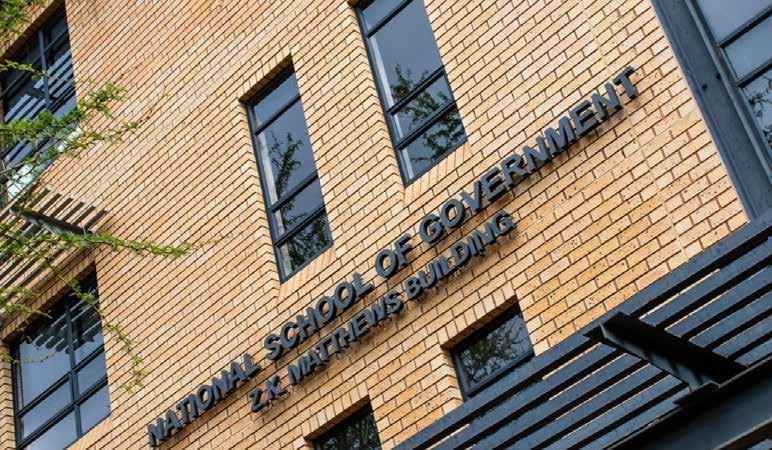
The initiative is aimed at promoting professionalism in
the Public Service and improving the performance of public servants in their respective roles and responsibilities in the three spheres of government – national, provincial and local.
Announcing the roll-out, Public Service and Administration Acting Minister Thulas Nxesi em-
phasised the need for ongoing education, training and development in the Public Service. He urged government departments to encourage employees to register for the courses.
“Government is serious about building a capable state and a public service that has the
requisite skills to serve the public efficiently, effectively and with courtesy. We will continue to invest in the training and development of public servants so that they can fulfil their tasks empowered by the necessary knowledge and expertise,” said Minister Nxesi.
The courses cater for all levels of employment; from interns to senior management. Public servants can enroll for the following courses with immediate effect:
• Citizen-centred Service Delivery: a programme aimed at helping public servants to re-engineer their relationship with the public and reflect on how they are delivering services to the citizens.
• Art of Facilitation for progressive realisation of socio-economic rights: the course is expected to empower traditional leaders to act as economic change agents in their communities and be able to create sustainable jobs and community wealth while also building an active rural citizenry who participate in and support economic development. It will also support the leaders to identify and utilise local natural resources in an environmentally sustainable way.
• Art of Facilitating Participatory Community Engagement: the course aims to build active citizens who know and assert their rights and can hold government accountable and to promote societal progress through
building an understanding amongst government officials on how to engage communities.
• Youth Development (Personal Mastery): the course aims to prepare young people, especially interns, for work beyond government with generic employability skills such as self-management, emotional intelligence, critical thinking and decision making, networking, as well as applying for jobs in the Public Service.
• Supply Chain Management for Public Service: to develop public sector supply chain management skills in order to accelerate service delivery and alleviate adverse supply chain management-related findings in departments and public entities.
• Avoiding Irregular, Fruitless and Wasteful Expenditure: the course will empower public officials with skills required for managing government expenditure in order to prevent irregular, unauthorised, fruitless and wasteful expenditure.
• Programme and Project Management: to empower public servants to design and deliver programmes
aimed at advancing the National Development Plan Vision 2030.
• Coaching for Leadership Development: to empower public servants with coaching skills and tools to enhance management individual development skills sets, as well as organisational development.
• Evidence-based Policy Making and Implementation: to empower officials with technical skills to be able to use a range of tools to support policy development and implementation processes.
This comes at a time when the country is commemorating Public Service Month – a reminder of what it means to serve communities and to also look at the impact government has,
especially around issues of service delivery. As part of Public Service Month, public servants are expected to:
• roll up their sleeves and spring-clean their service delivery points;
• visit schools, hospitals, police stations and courts, talk to citizens, mediate the delivery of services and getting things done;
• unblock the bottlenecks and red-tape in the delivery of services;
• ensure the systems and infrastructure are working and use public resources efficiently to the benefit of the citizens; and
• recommit themselves to belong, to care and to serve the people.
This year, Public Service Month is celebrated under the theme; “Batho Pele Revitalisation –Walking the Talk”.
For more information on the courses, contact the NSG at fundedprogrammes@thensg.gov.za
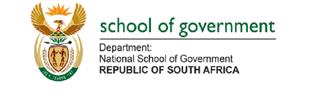
The Department of Public Service and Administration (DPSA) has launched a Public Sector Women in Leadership Network as part of its Women’s Month Programme for 2022.
The network seeks to empower and inspire women in leadership in the Public Service to become more resilient and effective managers. The network is not an organisation but a community of practice that will exist mainly as an online platform supported through activations in different provinces.
Speaking at the launch event, DPSA Director-General Yoliswa Makhasi said the need for the network arose after an observation of a gender and leadership disparity in the Public Service.
“We launched the network
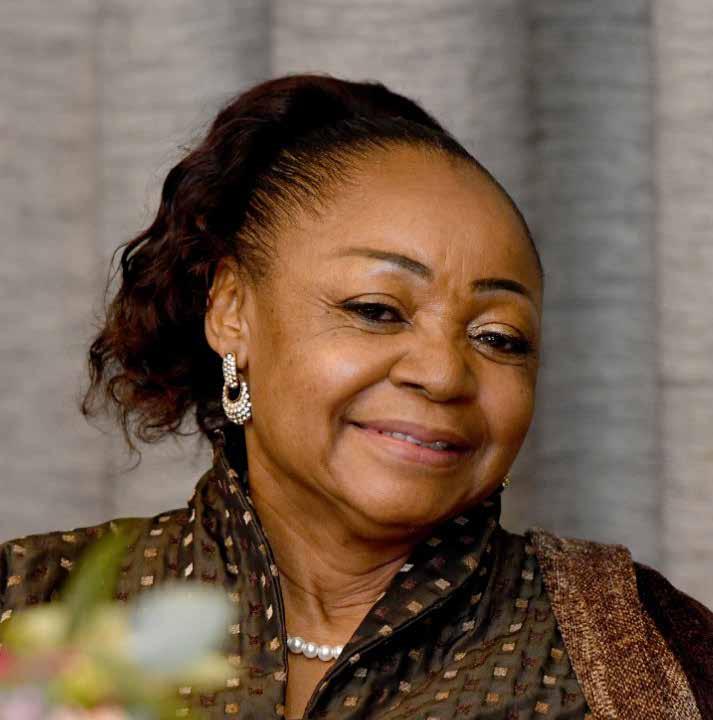
The network will empower and inspire women in senior management to become resilient and effective leaders in government.DPSA
Deputy Minister, Dr Chana Pilane-Majake.
recognising that women are not a homogeneous group and with the application of 50/50 representation principle, women have advanced in all sectors of society. The idea is to have a virtual community of practice of women in leadership within the Public Service networking, and sharing ideas and experiences,” Makhasi said. She said the three key pillars of the network will include educating members through free online resources and running leadership development programmes through the National School of Government and other partner networks. “We want to contribute to the transformation of the Public Service. This machinery will allow us to do so,” Makhasi said.
The network is also engaging with the private sector to be part of its support system. Official sponsor Absa Group’s Stephen Seaka committed the bank’s involvement for the next three years. “By giving support to government, we are not only setting a good example for other companies, but we are also encouraging the development and inspiration of future decision makers,” Seaka said.
DPSA Deputy Minister, Dr Chana Pilane-Majake, also spoke at the launch. She first acknowledged the women who marched to the Union Buildings, in Pretoria, on 9 August 1956 in protest against pass laws. About 20 000 women took part in the historic march and they included Struggle stalwarts Lillian Ngoyi, Albertina Sisulu, Helen Joseph, Rahima Moosa, Sophia WilliamsDe Bruyn and Ray Alexander.
Dr Pilane-Majake, therefore, viewed the launch of the network as yet another step in the long march towards creating
a more inclusive workplace.
“As we launch the network, we stand on shoulders of women who fought viciously towards emancipation of women. The status of women is indeed a test of civilisation, and we need to pose the question – how far have we progressed since this historic march 66 years ago?”. She acknowledged the empowering value of the network. “Not understanding the agenda of women you then become an impediment to their success. Sadly, we have not yet reached gender equality in key centres of power in society, including the State, economy, civil society organs and a range of
other institutions,” she said.
“The Public Service is obliged to provide a safe and healthy working environment, especially for women. I am hoping that as senior management, this instrument is considered to assess how far we have come in the improvement of the status of women in the Public Service.”
Makhasi revealed that there would be quarterly networking sessions in different provinces. The August activations were done in Gauteng, Eastern Cape and KwaZulu-Natal. “Plans are in place to visit other provinces in due course,” she said.

The increase in the number of visitors to the country’s national parks is an indication that the tourism sector is recovering from the impact of the COVID-19 pandemic, says Minister of Forestry, Fisheries and the Environment, Barbara Creecy.
“I am happy to report that in the 2021/22 financial year, the number of visitors to the country’s national parks increased by 74% from 1 996 667 during
the COVID-19 lockdowns of the 2020/21 financial year to 3 482 514,” Creecy said on Sunday.
Addressing the launch of the National Parks Week at Augrabies National Park, in the Northern Cape, the Minister said the recovery, primarily at this stage in the domestic tourism market, reflects that the South African Economic Reconstruction and Recovery Plan in the tourism sector is well on track.
She said conservation and biodiversity management in developing countries is only sustainable if communities living adjacent to national parks benefit directly from tourism and its associated ecosystems.
“Currently, South African National Parks (SANParks) and its concessionaires, employ over 6 100 people, 80% of whom are recruited from neighbouring communities.
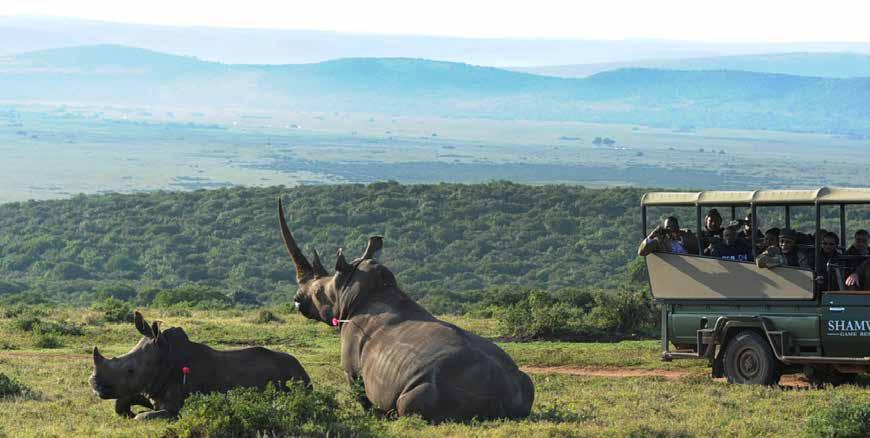
“Through the Expanded
Public Works Programme, a further 13 650 work opportunities were created last year and 835 Small, Medium and Micro Enterprises participated in providing goods and services to SANParks during the 2021/22 financial year.”
In an effort to expand the economic opportunities in the national parks, earlier this year SANParks hosted a conference where over 100 projects were launched, seeking investment
partnerships in accommodation, retail activities and restaurants in the national parks.
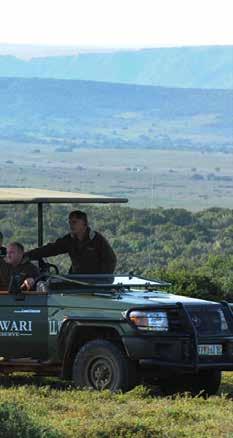
Last year the Minister’s office received the report of the HighLevel Panel of Experts (HLP) that reviewed the existing policies, legislation and practices on matters of elephant, lion, leopard and rhinoceros management, breeding, hunting, trade and handling.
“The panel made two important findings. The first was that despite having a range of biodiversity and sustainable use legislation and policies, biodiversity loss continues to
threaten the health of ecosystems and survival of species, and results in negative impacts for livelihoods and the economy.
“Global change, habitat loss and degradation, invasive alien species, overharvesting, and illegal harvesting all threaten South Africa’s biodiversity. The second was that South Africa’s biodiversity sector remains substantially untransformed and there is inequality in access to benefits arising from biodiversity and associated ecosystem services,” she said.
Furthermore, the sector has not reached its potential in terms of the contribution to the economy and growth domestic product (GDP).
Additionally, the panel noted that certain practices bring the biodiversity sector and its commitment to sustainable use into disrepute and harm the country’s international status as an ecotourism destination.
“The HLP recommendations provide a very clear way forward on how to address key sector challenges and highlight the importance of transformation of the sector, with empowerment and capacitation of communities living with wildlife, and recognition of their traditions and culture, as practiced through the traditional leaders and traditional healers.
“It also recommended the need for a more holistic approach to sustainable use, which ensures responsible and humane use of South Africa’s biodiversity, and the ending of poor and harmful practices, such as those associated with the captive lion industry,” she said.
Government has released the draft White Paper on sustainable use and the Game Meat Strategy for public comment.
The draft White Paper focuses on transformation, with access and beneficiation by communities adjacent to protected areas, as well as for previously disadvantaged individuals.
“Its vision is for a prosperous nation, living in harmony with nature. To accomplish this, the mission is to conserve South Africa's biodiversity, and maintain and restore ecological integrity.
“In doing so, we must provide transformative socio-economic development benefits to the nation, through justifiable, responsible, and ecologically sustainable, and socially equitable, use of components of biodiversity encapsulated in the impact statement of ‘Thriving People and Nature’,” Creecy said.
The draft White Paper also
sets out important principles, which will guide future policy, legislation, and decision-making across the sector.
“This includes reshaping ecologically sustainable use in a responsible manner. This means ensuring species persistence, and the ecological integrity of ecosystems. Social responsibilities are emphasised, as is the welfare of animals.
The Game Meat Strategy acknowledges the significant contribution made by current wildlife businesses and the various associations that drive critical elements of the value chain.
“Key to taking the new strategy forward will be to harness their experience and expertise. New private sector investments will be needed, and partnerships and collaborations will be essential, meaningful, and with buy-in from all stakeholders.
“In our view, properly implemented, the Game Meat Strategy will allow for compatible land use on the outskirts of our national parks, and ensure a sustainable off take for surrounding communities.
“Given the high level of interest in both policies, the department has extended the period of public consultation until 26 September,” the Minister said. –SAnews.gov.za









South Africa is one of those countries where you are absolutely spoilt for choice when it comes to choosing a new place to explore. One destination that can’t be overlooked, especially for Heritage Month, is the Wild Coast. Here, the pastoral rhythms and rugged natural beauty remain much as they have been since lifetimes past.

There are, however, plenty of reasons why planning a trip to the Wild Coast can be
daunting – badly potholed roads, any number of straying livestock, misleading signposts and, to top it all, patchy cellphone reception for when you inevitably get lost.
But a mere one hour’s drive northeast of East London lies a veritable gem. Although 8 km away from the Kei River mouth and, therefore, not technically in the Wild Coast, it combines all the beauty and wildness of this unmatched stretch of coastline with a
reassuring dose of modern conveniences.
Picture towering grassy cliffs with near-vertical rocky faces plunging into the sea, azure blue waters home to frolicking dolphins and whales, long white sand beaches and unspoilt coastal and riverine forests alive with birdsong. I’m talking of course about Morgan Bay.
With our previous Wild
Coast experiences having ranged between the extremes of the increasingly touristy Coffee Bay and the relatively inaccessible Dwesa-Cwebe Reserve, arriving in Morgan Bay was an absolute revelation. We somehow felt like the only visitors in this peaceful beachfront village. We took the journey during the month of April and our initial expectations were of a quiet little getaway with not much to do other than eat delicious food, sleep late and relax on the soft sand beaches.
A short conversation after check-in at our hotel soon set us straight though.
As well as the obvious beach time, we realised we were going to be spoilt for choice. From water activities to hiking, birdwatching, horse riding or rock climbing the iconic Morgan Bay cliffs, we had our share of outdoor activities lined up! And that’s not forgetting chilled lunches at one of the restaurants in town, beauty treatments at the local spa or sundowners from the clifftop overlooking the bay.
Was a three-day stay going to be long enough?
Early the next morning we put on hiking boots, grabbed binoculars and water bottles
and hit the Strandloper Hiking Trail. This trail meanders along cliffs and beaches from Kei Mouth to East London. With time to complete only a short section of it, we joined the local herds of goats and climbed the cliffs, being sure to stay well away from the edge in places where they seemed to know no fear of heights. Later we happily ditched the boots and let the soft white sand and crisp water of Morgan Bay’s beach caress
our tired feet on a solo sunset stroll. Crabs scuttled between the receding waves and soft dunes, their movements an echo of the water rushing up and down. Plough snails with fleshy foot firmly anchored in the shifting sand peppered the waves’ retreat, and all was absolute peace and beauty.
By far though, our absolute favourite activity of the visit for its uniqueness was a morn-
before you go Morgan Bay’s swimming beach is manned by lifeguards during peak holiday seasons. There are three restaurants and a convenience store in town, as well as an FNB ATM. The road to Morgan Bay is tarred except for the last 7 km, which is a well-maintained dirt road. Accommodation ranges from camping to fully-catered guesthouses and hotels, but we recommend the Mitford Hotel. With its old-world charm it is a piece of Morgan Bay history and its beachfront rooms and restaurant are a welcome haven at the end of a day out.
ing spent on the aptly-named Treasure Beach. The coastline of the Wild Coast, with its rough seas and rocky ledges is particularly treacherous for vessels, but never more so than in the centuries gone by when ships were navigating
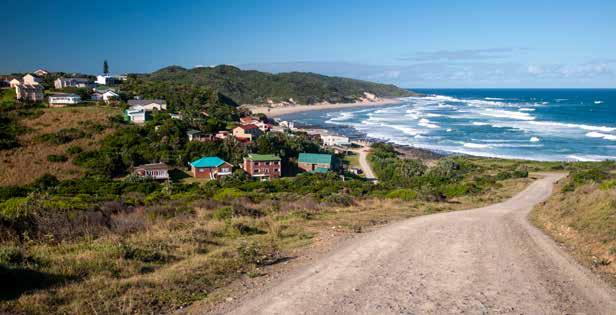
with rudimentary maps and relying on little more than wind power. Needless to say, the coastline is littered with shipwrecks and the beaches haunted by ghost stories.
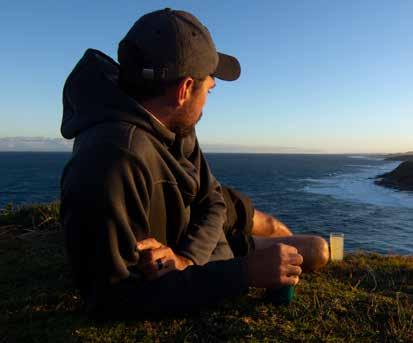
In the 1600s, the Portuguese Santa Espirito sank close to the beaches of Double Mouth Nature Reserve. Over time, the sea has slowly worked up the spilled cargo of Ming pottery and Carnelian beads, littering the beach with this ancient treasure. Part hard work digging in the sand and part luck reveals all kinds of one-of-akind artefacts and keepsakes that were last touched by human hands many hundreds of years ago.
Whether your idea of a perfect break is indoor pampering and fine dining, or something outdoors and action packed, we are convinced that Morgan Bay is the perfect getaway. And what better way to celebrate national Tourism Month than by packing your bags for somewhere new?

As we celebrate Heritage Month, we look at local food and ingredients that South Africa has become so well known for. From food on the braai to our desserts and from vetkoek to biltong, South African food is all about good flavour as we draw from our combined cultures. We share some nice recipes from local cooks for some proudly South African dishes you can try.
4
Ingredients:
• 3 sheets phyllo pastry.
• olive oil spray.
• 80 ml cooked, *caramelised onion.
• 300 g honey roasted butternut wedges.
• 80 g crumbled feta cheese.
• 80 ml low fat sour cream.
• 1 egg.
• 80 g thinly sliced biltong (use lean biltong).
• fresh basil for serving.
*Caramelised onions: Use 1 large onion, sliced thinly and sauteed in olive oil till golden brown and caramelised.
• Pre-heat the oven to 180°C.
• Lay a sheet of phyllo pastry on the work surface. Spray with olive oil, top with second sheet and spray with olive oil. Do the same with third sheet of phyllo pastry.
• Cut the layered sheets in half and place on top of one another.
• Line a greased rectangular quiche dish with the pastry sheets – cut off any excess pastry with scissors.

• Mix the egg and sour cream together and spread on the pastry.
• Top with caramelized onion, butternut and the feta cheese.
• Bake in oven for about 15 minutes.
• Remove from the oven, cool slightly and top with the biltong slices and fresh basil.
Beef Fillet Kebabs (Courtesy of Fatima Sydow from her book, Fatima Sydow Cooks)
serves 2-3 Ingredients:
• 600 g beef fillet.
• salt and pepper, to taste.
• 15 ml (1 tbsp) smoked paprika.
• 10 ml (2 tsp) ground cumin.
• 5 ml (1 tsp) whole cumin seeds.
• 15 ml (1 tbsp) fresh coriander, chopped.
• 60 ml (4 tbsp) orange juice.
• 30 ml (2 tbsp) olive oil.
Method:
• Cut the fillet into bitesized cubes. Place the beef pieces into a large bowl, add the rest of the ingredients and mix well. Cover with cling wrap and leave to marinate at room temperature for 15 minutes.
• Thread 4 beef pieces on a metal kebab skewer, leaving a little space between each piece of meat to ensure even cooking. Repeat until all the meat pieces are on skewers.

• Grill on a hot griddle pan or on the braai over hot coals for 2 minutes on each side. Serve on their own or with a fresh salad.
• Instead of orange juice you can make the marinade with lemon juice. You can also add the zest of the orange to the marinade. The kebabs can be prepared hours in advance.
• Wrap them with cling wrap and marinate them in the
fridge. Before grilling allow the meat to come to room temperature. You can add slices of different coloured bell peppers between the meat pieces as well.

What is a summer lunch or braai without a crisp, crunchy coleslaw? You can throw this salad together in a jiffy –ideal for relaxed, hassle-free entertaining. It’s so refreshing and contrasts beautifully with the grilled meat straight off the braai.
Serves 6 Ingredients:
• 350 g mixed cabbage, shredded.
200 g carrots, grated. 50 g spring onions, chopped.
• 2.5 ml (½ tsp) salt.
• 60 ml (¼ cup) sugar.
• 250 ml (1 cup) mayonnaise.
• 30 ml (2 tbsp) black sesame seeds.
Method:
• In a large bowl, combine the cabbage, carrots and spring onions and give them a quick stir. Next, add the salt,
sugar and mayonnaise and mix well.
• Chill in the fridge for 30 minutes or overnight to allow the flavours to develop.
• Sprinkle over black sesame seeds and serve with roast chicken, grilled meat or on a sandwich.
Tips: Instead of cutting the cabbage by hand, shred it finely in a food processor. This salad will keep in the fridge for three to five days.
Malva Pudding on the Braai (Courtesy of Jan Braai)
Serves 6
Want to test your skill on an open flame? – this is your chance. Otherwise, opt for the conventional oven and bake at 180° for 30-40 mins.
Ingredients:
The Batter:
• 1 cup flour.
• 1 teaspoon bicarbonate of soda.
• 1 cup white sugar.
• 1 egg.
• 1 tablespoon apricot jam.
• 1 tablespoon vinegar.
• 1 tablespoon melted butter.
• 1 cup milk.
For the sauce:
• ½ cup cream.
• ½ cup milk.
• 1 cup sugar.
• ½ cup hot water.
• ½ cup butter.
Method:
• Light the fire. You need fewer coals than when braaing steak, but you’ll need a steady supply of coals once the pudding is baking. Now use butter to grease your no. 10 flat-bottomed baking potjie.
• Sift the flour and the bicarbonate of soda into a large bowl and stir in the sugar (you don’t need to sift the sugar).
• In another mixing bowl, whisk the egg very well. Now add the jam, vinegar, butter and milk, whisking well after adding each ingredient.
• Add the wet ingredients to the dry ingredients and mix well.
• Pour the batter into the
potjie, put on the lid and bake for 50 minutes by placing some coals underneath the potjie and some coals on top of the lid. Don’t add too much heat, as burning is a big danger. There is no particular risk in having too little heat and taking up to 1 hour to get the baking done, so rather go too slow than too fast. During this time, you can add a few fresh hot coals to the bottom and top of the potjie whenever you feel the pudding is losing steam.
• When the pudding has been baking for about 40 minutes (about 10 minutes before it’s done), heat all the sauce ingredients in a small potjie over medium coals. Keep stirring to ensure that the butter is melted and the sugar is completely dissolved, but don’t let it boil. If you want a (slightly) less sweet
pudding, use half a cup of sugar and a full cup of hot water for the sauce, instead of the other way round as per the ingredients list.

• After about 50 minutes of baking, insert a skewer into the middle of the pudding to test whether it’s done. If the skewer comes out clean, it’s ready.
• Take the pudding off the fire and pour the sauce evenly over it. Believe me, it will absorb all the sauce – you just need to leave it standing for a few minutes. Serve the malva pudding warm with a scoop of vanilla ice-cream, a dollop of fresh cream or a puddle of vanilla custard. A good way to keep it hot is to put it near the fire, but not too close – after doing everything right, we don’t want it to burn now.

